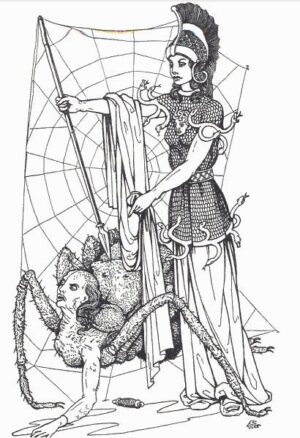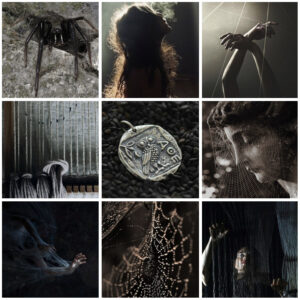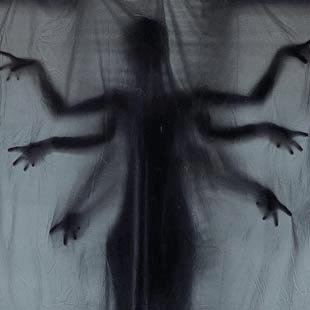Arachne, a Lydian maiden bearing fingers as nimble as the gods, was said to have been able to weave the most beautiful fabrics from the finest of threads. Although the story stems from a lesser-known tale from Greek mythology, Arachne has been steadily gaining popularity among occult circles as a deity.
She was the daughter of a shepherd and craftsman, and just as she spun him the finest of wools, her father was famed for dying his fabrics in the most majestic shades of purple.
While not originally worshiped as a goddess, Arachne has risen in fame in more recent years. As more neopagans flock to honor this archetype, she continues to gain power.
The Maiden Arachne In History & Myth:

Unfortunately, not many know the origins of this archetype. Because Arachne is a more obscure entity, it may be difficult to find information on working with her. Let’s take a deeper look at what we do know about Arachne’s role in mythology and how it applies to practitioners today.
To Spurn A Goddess: Athena and Arachne

This is the most common story of Arachne, passed down in myth.
Arachne was the daughter of a man named Idmon, a craftsman famous for his luxurious wool dyed a gorgeous shade of royal purple.
She was so skilled that even the beautiful nymphs abandoned their lush meadows and streams to marvel at her craft, and Arachne became a bit of a braggart in response to her fame. While most would take the time to thank the gods for their generosity – particularly when blessed with such an ability – Arachne was quick to toot her own horn.
Rather than paying tribute to Athena, the goddess of crafts, wisdom, and uh… war, Arachne boasted that her talent far surpassed that of the goddess.
One day, Arachne was approached by an old woman with long grey hair, supporting her brittle body with a cane. The poor old woman begged Arachne to humble herself lest she upset the gods, but the weaver pressed on.
According to the poet Ovid, Arachne boasted loudly that she was greater than even Athena, the goddess of crafts. She boisterously insulted Athena and challenged her to a weaving competition. Publicly calling out the goddess and calling her a coward if she didn’t accept, she was quite obviously quick to earn Athena’s notice.
The old woman then revealed that she was, of course, Athena herself in disguise. Needless to say, the goddess of war is always down for a challenge. The two took to their looms and wove away. After some time, they finished their works of art.
Athena’s tapestry was incredibly detailed, showing the Olympian gods in all their valor as they put mortals in their place for committing injustices much like Arachne had that day.
Arachne’s tapestry, however, was decorated with intricate yet lewd depictions of the affairs of the gods. Not only was it a disgraceful display of debauchery, but it was also divinely woven and framed with an intricate border design of flowers and ivy.
In some versions of the tale, Arachne portrayed the gods as animals performing sexual acts with human girls. I’m a little surprised Ovid and other poets of the age bothered to go into such detail, to be honest.
So let’s just say – hypothetically, of course – that Arachne’s handiwork outshone Athena’s greatly. There wasn’t a single thread out of place in her tapestry, and it contained the deepest and brightest purples woven together as intricately as the night sky.
Remember that part about Athena being the goddess of war? As you might expect, Athena was pissed when she lost and flew into a fiery rage. She proceeded to beat Arachne to a bloody pulp, hitting her in the face with her shuttle and tearing her tapestry to shreds.
Although she survived the skirmish, Arachne was so mortified by the ordeal – and perhaps terrified of the goddess’s wrath – that she tried to hang herself as a means to escape.
In Arachne’s final moments, Athena spared her from death and instead transformed her into a spider. Arachne and the generations that followed would be doomed to hang forever from a spider’s silken strand as a symbol of the rope Arachne wished to end herself with. Her weaving would be done at a much smaller scale, from then on, and it would become a required skill for her to eat and survive.
In an alternate story of Arachne, the weaving contest would be judged by none other than Zeus himself. The loser in this tournament would be doomed to never touch a spindle again. In this version, the goddess Athena triumphed instead. Arachne was so disappointed to have to give up her craft that Athena showed mercy by changing Arachne. In doing so, she could spend the rest of her days weaving as much as she wanted: a sign of pity from the goddess she insulted.
It’s clear that Athena and Arachne go hand in hand with both myths: they represent two opposite forces. Athena is the more powerful force, the one who decides what is true, while Arachne is (supposed to be) subservient to Athena, something she denies.
So, How Does Arachne’s Story Apply To You?

In any form, Arachne’s story is retold as a cautionary one, highlighting the dangers that might arise when one chooses to disrespect the gods. Not only a strict lesson in humbleness, it also warns that we as mortals should never try to compare ourselves with the gods. Better yet, if we are specifically warned to stop doing so, it’s probably that god in disguise issuing a warning.
As an artist that sometimes suffers from imposter syndrome, the myth strikes me in an entirely different way. I often have a hard time looking back on my creations without focusing on how they could be improved. In a way, I find Arachne’s confidence incredibly inspiring – an aspect to be harnessed, for sure.
It’s also important to remember that the Greek gods are accepted as fallible, unlike gods of certain other religions, despite committing similar acts. In going out of her way to show the flaws of the gods, Arachne was displaying an unnecessary sense of pride. Although Arachne places herself among the gods by shouting this flaw for all to hear, it is one that we can learn and grow from.
In what ways can we tame our haughtiness and instead hold a healthy sense of confidence? Placing her among other gods in the mythos, in what ways can we learn from Arachne’s mistakes?
What I find interesting about Arachne’s story is that her fame in the modern age doesn’t seem to stem from her mythology but from fearsome depictions of her that have withstood the sands of time and haunt mankind to this day. While I was only recently made aware of Arachne’s tale, she has consistently crept into my dreams and fantasies. In my opinion, it shows just how the worship of an entity can make her stronger, even if she wasn’t originally praised as a goddess.
As a woman, I understand completely why modern practitioners embrace the deification of Arachne. She defied the gods (or the reigning forces of power at the time) and was swiftly punished for her wrongdoing. But not only did she act out against them – she put their acts of wrongdoing on display for all to see. In a mythos of Olympian rapists and murderers, Arachne told the world what was wrong with the big picture. She wasn’t afraid to stand out from the crowd, even to her own peril.
And while Arachne was struck down by Athena, it’s important to note that Athena represents the big guys, the ones you should be afraid to cross. Arachne wasn’t, and it costs her the human life she led, but she also goes down in history and myth as one of the few people who exposed the dark side of the gods. She is never forgotten and this is for a reason.
Arachne’s Appearance:

Not much is said of Arachne’s physical appearance prior to transformation. She is often depicted in art with dark brown or black hair (until she was changed into a spider). There are tales of her long, nimble fingers that would be transformed into spindly spider legs at the goddess Athena’s whim.
Generally, Arachne was said to be a beautiful young woman. People traveled far distances to see her weaving skills and her great beauty.
Some depictions of Arachne show her in mid-transformation, or even as a half-spider creature with a woman’s upper body. Other works of art feature a woman with eight long legs protruding out from her back.
Arachne’s Powers:

Whether she was able to defeat the goddess of crafts or not, one of Arachne’s greatest strengths was her creative abilities. Not only were her fingers deft and steady, but she slyly used her skills to design a tapestry that burned Athena in all the right ways.
Like other entities associated with weaving, it has been questioned whether or not Arachne may hold the power to braid the very strands of fate. This seems to be a later association that was tied to her archetype after deification, rather than an initial power of hers.
She could be an entity to call upon if you want to be blessed in your craft, but based on her haughtily-stated belief that her skill had absolutely nothing to do with the blessings of the gods, well, betting on that is up to you.
How Do You Know If Arachne Is Calling To You?

Although you can theoretically call upon a deity with extensive amounts of worship, deities often reach out to us when they want to work with us.
Arachne tends to reach out in very subtle ways. It can be difficult to determine whether or not she is the entity reaching out to you, but there are a few specific tells.
Some of the indicators that Arachne is reaching out to you include:
1. You see an uncanny amount of spiders throughout your day. That said, if you live in an environment that is a conducive habitat to spiders, you may want to relocate…
2. You feel drawn to spiders. If you encounter a lot of spiders throughout your day and that is absolutely not your thing, then it’s probably not a sign from Arachne. She will seek out those who are accepting of her kin. If you do see a lot of spiders, you’ll probably feel some sort of connection with them, as though you can communicate in a way.
3. You dream of Arachne or of her spiderlings. If Arachne or her minions visit you in your dreams, it is probably with the intent of delivering a message of her interest in you.
4. You are a lover of the crafts. While this may also be an indicator that you should work with Lady Athena, if you are particularly fond of weaving or textile art, then Arachne may be calling to you instead. You’ll have to trust your intuition on this one. She’s also known to lend her aid to those who enjoy knitting, sewing, or other related crafts.
If you’re still unsure, you can ask an entity directly using a pendulum or get a reading from a medium you trust. Always exercise caution when working with unfamiliar entities and be sure to set protective boundaries prior to communication.
How To Work With The Archetype Of Arachne:

Arachne, as a spinner and weaver, is a lesser-known patroness to artists, tradespersons, creatives, and craftsmen. For those who don’t necessarily identify with the goddess of craft Athena, this underdog of the arts can be a much more relatable archetype.
Devotional Acts To Arachne
Spend time crafting or sewing. If you don’t have any creative hobbies that you currently practice, then learning a new craft is also a great way to connect with Arachne.
Study your local arachnid species. Spend time in nature observing the local spiders in order to get to know them better.
Always be kind to spiders. Avoid squashing eight-legged friends that you discover indoors. If possible, safely relocate them outside so that they can help support the ecosystem.
Take lessons from creative mentors. Use Arachne’s story as a lesson to honor the teacher that bestows their gifts upon you.
Write poetry dedicated to Arachne, art, or spiders.
Be outspoken and stand up for what you believe in. Not only was Arachne confident in her abilities, but ultimately, she was right. Her tapestry was WAAAY better than Athena’s and displayed truths about the gods that many weren’t ready to see. To show devotion to Arachne, you’ll need to speak up for what you believe in, even if literally no one else agrees.
Support local artists and craftsmen. If there’s a local craft fair or art show, make sure to stop by and show your support for the artists who put all their hard work into creating something for the world to enjoy.
Tailor or dye your clothes. In honor of Arachne’s father Idmon, you can dye your clothes purple or make other DIY adjustments that are appropriate to your style.
Offerings For Arachne
Although the deification of Arachne is debatable, you can still make offerings to this entity if you intend on working with her.
- Silk
- Handmade items or works of embroidery
- Spider plants
- Spider lilies
- Wolfsbane (careful – this herb is poisonous!)
- Artistic depictions of spiders
- Thread, yarn, or any textiles
- Craft supplies
- Purple candles
- Fabric dye
In addition, you can offer anything to Arachne that feels right to you – there’s no wrong way to show praise to the Queen of Spiders.
As always, use caution when inviting in new deities or entities. If you don’t feel like an entity is actually reaching out to you, there’s no need to worry. You don’t have to wait for a sign from the gods to worship or make an offering to a deity. In fact, doing so may help you to gain their favor if you haven’t built a prior relationship.
What Can You Learn From Working With Arachne?

Though Arachne isn’t technically a goddess in the Greek pantheon, I do believe that she has a much stronger energy than us mortals (typically) and exists in spirit form. I also believe that, like most other ancient beings, she is willing to help us in exchange for worship.
If you want to work with Arachne, you can of course hone your weaving/knitting/sewing/crafting skills. After all, she’s one of the original weavers! I find that the energy of Arachne is all around me lately, especially when I’m crafting. You can even craft a specific piece in her honor.
However, Arachne can also teach you how to stand up for yourself when you’re afraid and when most others are against you. She stood up for what she believed in regardless of the consequences. Nowadays, we call her actions “hubris,” but what if she was right? What if she had developed those skills alone and didn’t want to attribute them to Athena? What if she stood up for herself in order to maintain her autonomy at any cost?
If you feel “different” from the crowd in a certain way then Arachne can be the perfect deity to work with. She will show you that you must maintain your sense of self, regardless of what happens, because that’s all you truly have. She’ll teach you that your skills and your accomplishments are yours. She’ll show you how to rely on yourself instead of others.
Arachne’s symbol is the spider, an often misunderstood creature. If you find yourself identifying with this metaphor at all then you may want to consider reaching out to her.
Personally, I think that Arachne was born well before her time. She takes a very modern-day approach to her relationship with Athena. While it doesn’t work out for her then, she is able to teach skills that many of us still need. Primarily, she teaches us to do what we believe is right, even if it’s not popular.


